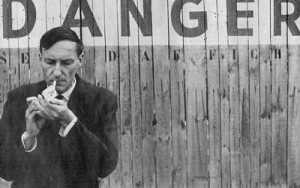 The University of Kansas recently acquired several items from the estate of William S. Burroughs, including the working materials for Last Words. This is a major deal for the University. The journals will provide a great source for scholars researching Burrough’s work, and will bring attention to the university. Burroughs lived in Lawrence for the last fifteen years of his life, and this would seem like a significant local connection.
The University of Kansas recently acquired several items from the estate of William S. Burroughs, including the working materials for Last Words. This is a major deal for the University. The journals will provide a great source for scholars researching Burrough’s work, and will bring attention to the university. Burroughs lived in Lawrence for the last fifteen years of his life, and this would seem like a significant local connection.
Burroughs is a polarizing figure within literature. Some critics considered him a genius and others considered him a hack. Regardless, he influenced a variety of artists, including writers and musicians. When I read the press release, I was excited for the University. Even though Burroughs is not in my area of literary scholarship, I was excited for Lawrence. While the attention often goes to basketball this time of year, Lawrence has a thriving arts scene that includes the literary arts. We have several writers groups while most communities are lucky to have one. Besides Burroughs, Lawrence has been home to several prominent writers, most notably Langston Hughes. I filed the news away under the “Cool…good to know” section of my brain, and didn’t think much of it until a letter to the editor in a recent edition of the local paper. (more…)